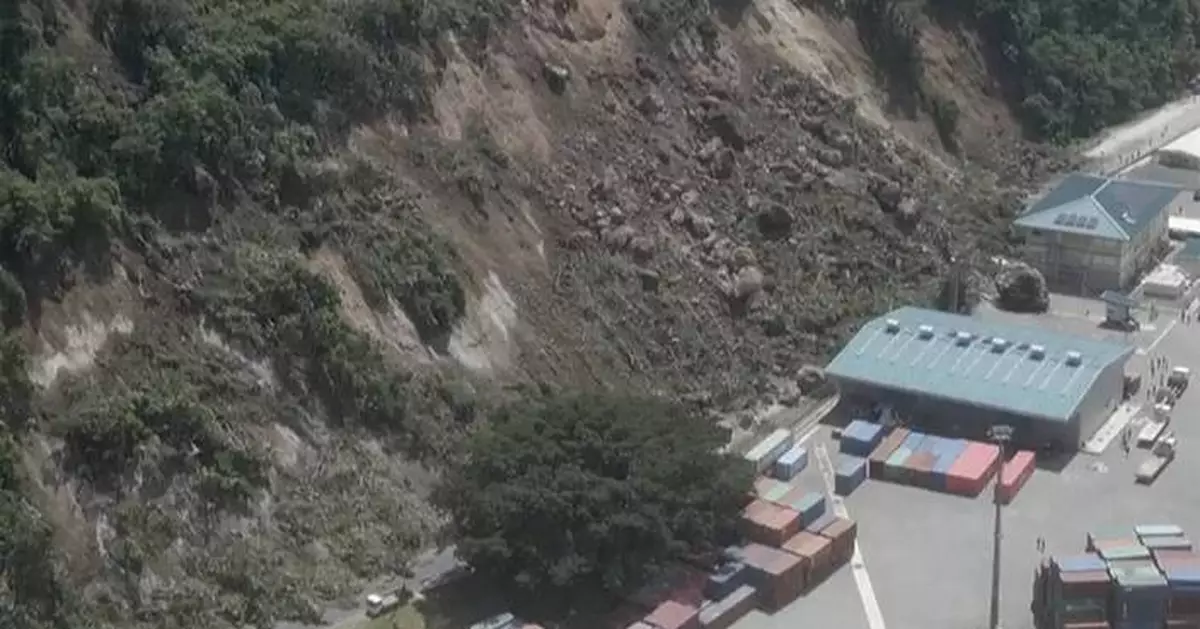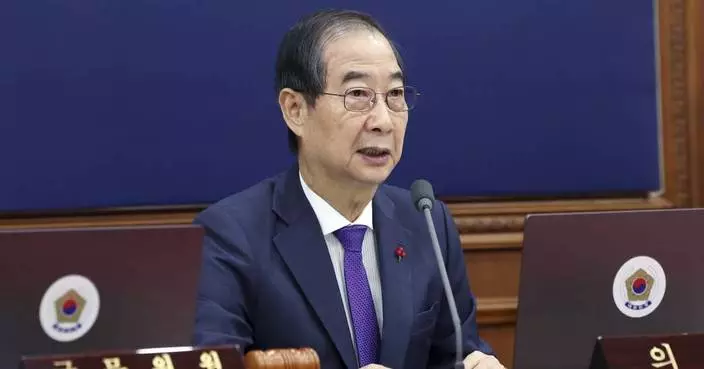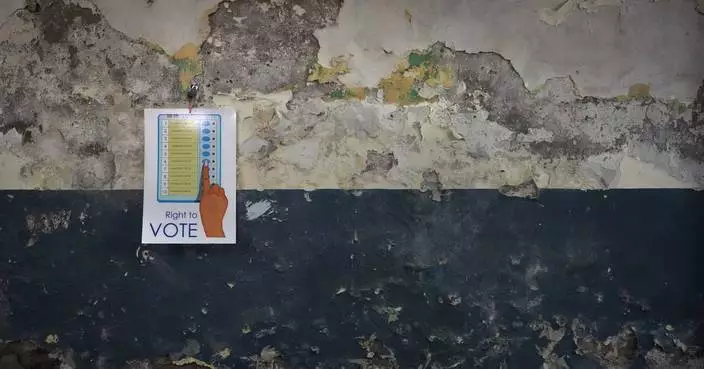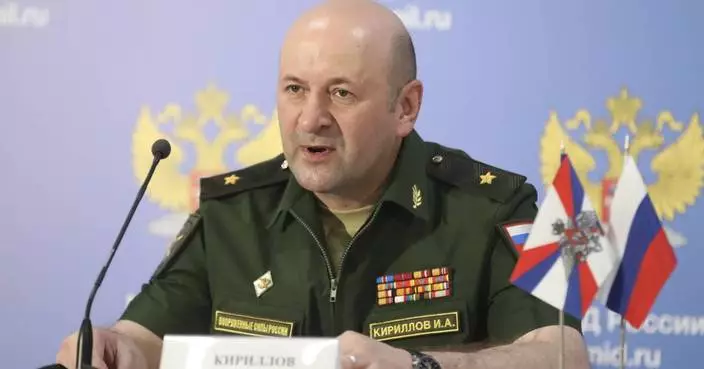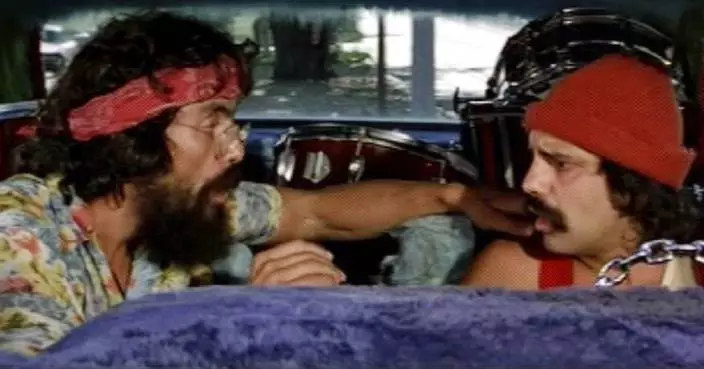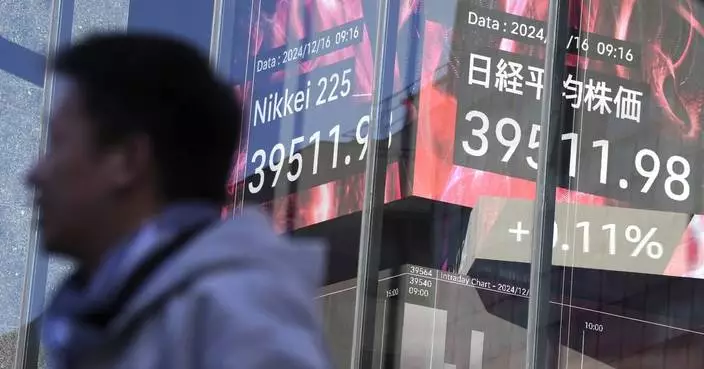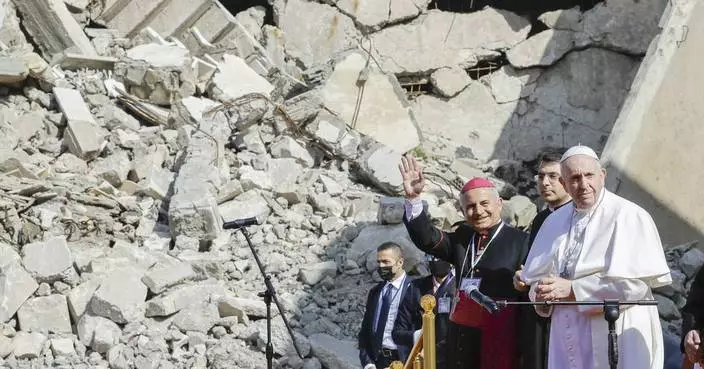WELLINGTON, New Zealand (AP) — A powerful magnitude 7.3 earthquake struck just off the coast of Vanuatu on Tuesday, causing widespread destruction in the South Pacific island nation as the injured began arriving at a hospital and unconfirmed reports of casualties emerged.
A tsunami warning was called off less than two hours after the quake. With communications still down hours later and official information scarce, witness accounts of casualties began to surface on social media and through patchy phone calls.
Click to Gallery
A building damaged in Port Vila, Vanuatu, following a powerful earthquake Tuesday, Dec. 17, 2024. (Tim Cutler via AP)
The inside of a building damaged is seen in Port Vila, Vanuatu, following a powerful earthquake Tuesday, Dec. 17, 2024. (Tim Cutler via AP)
The inside of a building damaged is seen in Port Vila, Vanuatu, following a powerful earthquake Tuesday, Dec. 17, 2024. (Tim Cutler via AP)
A building is seen damaged in Port Vila, Vanuatu following a powerful earthquake Tuesday, Dec. 17, 2024. (Tim Cutler via AP)
A building is seen damaged in Port Vila, Vanuatu, following a powerful earthquake Tuesday, Dec. 17, 2024. (Tim Cutler via AP)
This image made from a video shows a landslide near an international shipping terminal in Port Vila, Vanuatu following a powerful earthquake Tuesday, Dec. 17, 2024. (Dan McGarry via AP)
This image made from a video shows a landslide near an international shipping terminal in Port Vila, Vanuatu following a powerful earthquake Tuesday, Dec. 17, 2024. (Dan McGarry via AP)
The earthquake happened at just before 1 p.m. at a depth of 57 kilometers (35 miles) and was centered 30 kilometers west of Port Vila, the largest city in Vanuatu — a group of 80 islands that is home to about 330,000 people. It was followed by a magnitude 5.5 aftershock near the same location, with tremors continuing throughout the afternoon and evening.
It was not immediately clear how much damage was caused as phone lines and government websites remained down. In the first official information published on social media, the Geohazards Department said its monitoring systems remained offline due to power outages.
Residents were urged to stay away from coastlines for at least 24 hours — and until tsunami and earthquake monitoring systems were operational once again. No confirmed reports of damage or casualties were provided, but accounts detailing widespread destruction filtered out on social media and in interviews.
Dan McGarry, a journalist based in Port Vila, told The Associated Press he heard of one death from a police officer outside Vila Central Hospital. McGarry saw three people on gurneys “in obvious distress,” he said.
Doctors were working “as fast as they could” at a triage center outside the emergency ward, he added. But the nation is not equipped for a mass casualty event, McGarry said.
Video shared by the Vanuatu Broadcasting and Television Corporation showed crowds outside the hospital. Phone numbers for the police, the hospital and other public agencies did not connect.
A video posted on social media appeared to show crumpled buildings in Port Vila, including one that had collapsed onto its lower floors and cars parked on the street below. Amanda Laithwaite said her husband was among a group of rescuers attempting to shift the roof of the three-story building because they believed people were trapped inside, but their progress was slow without specialist machinery.
Elsewhere, a building housing a number of diplomatic missions in Port Vila — including those of the United States, Britain, France and New Zealand — was significantly damaged, several of its tenants said. But there were no reports of embassy staff unaccounted for.
The U.S. Embassy's Facebook page said all staff were safe, but the building was closed until further notice. The office had only opened in July, as part of a wider push by the U.S. to expand its Pacific presence in order to counter China's burgeoning influence on governments in the region.
Australia's foreign ministry also said its workers were safe.
A video on social media showed the building with some damage to its structure, including buckled windows and debris that had crumbled from walls to the ground. Other photos and videos showed items and shelves that had tumbled to the floors of shops and landslides that appeared to block some roads.
“We haven’t heard at the moment about any casualties, but I will be shocked if we don’t hear that bad news coming through from Port Vila at some point,” Katie Greenwood, the Fiji-based head of the Asia-Pacific regional office for the Red Cross, told the Australian Broadcasting Corp.
McGarry said a “massive landslide” at the international shipping terminal was likely to impede the country's recovery. The airport's runway is also damaged, he said.
Port Vila's airport could not be contacted on Tuesday, but flight tracking sites suggested all flights were grounded. Some airlines in Australia and the Pacific said they had cancelled or paused flights scheduled for Wednesday and were awaiting news of the airport's status.
Australian Foreign Minister Penny Wong told reporters that her country would provide whatever help was needed. New Zealand’s Foreign Minister Winston Peters said 45 New Zealanders were registered as being in Vanuatu and his government was “deeply concerned” about the situation there.
Vanuatu has been led by four prime ministers in four years and is due to go to the polls in January for a snap election. In November, Prime Minister Charlot Salwai asked President Nikenike Vurobaravu to dissolve Parliament so he did not have to face a no-confidence vote as his recent predecessors did.
But Vanuatu is accustomed to natural disasters, including havoc wrought by cyclones and volcanic eruptions. Its position on a subduction zone — where the Indo-Australia tectonic plate moves beneath the Pacific Plate — means earthquakes of greater than magnitude 6 are not uncommon and the country's buildings are intended to withstand quake damage.
—-
Associated Press writer Rod McGuirk in Melbourne, Australia, contributed to this report.
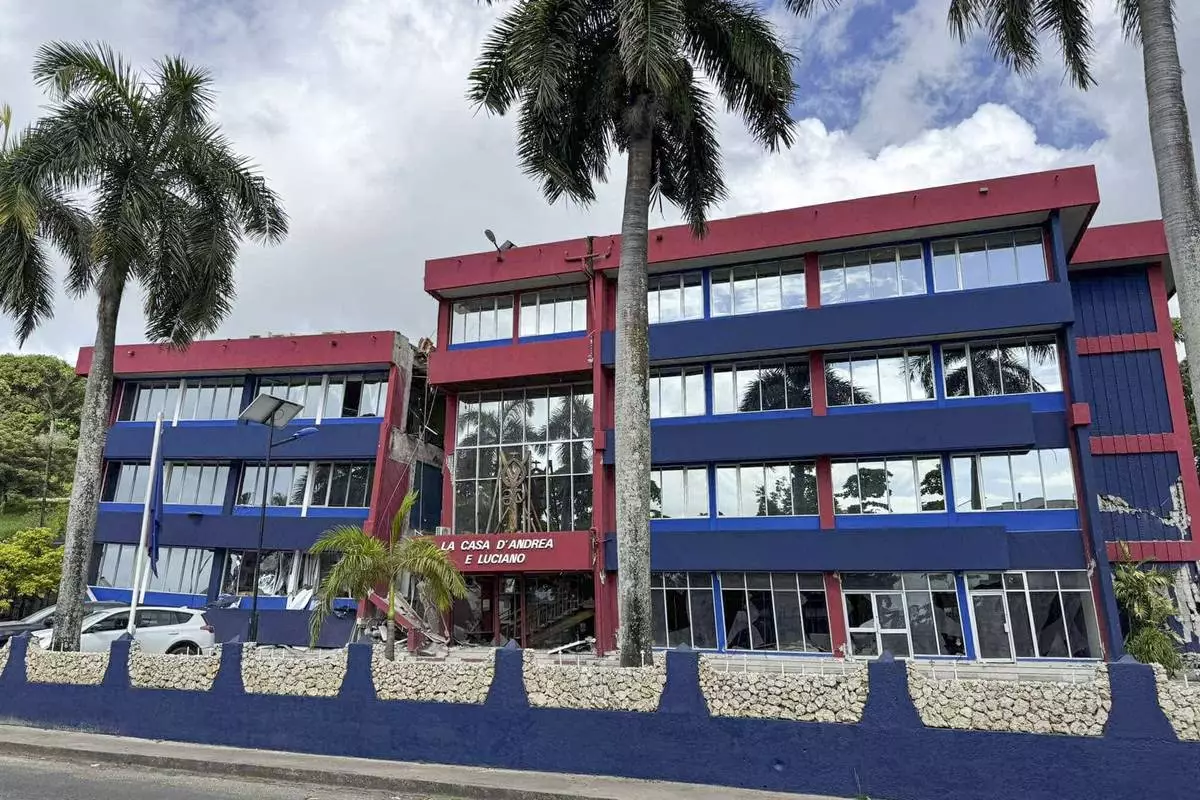
A building damaged in Port Vila, Vanuatu, following a powerful earthquake Tuesday, Dec. 17, 2024. (Tim Cutler via AP)
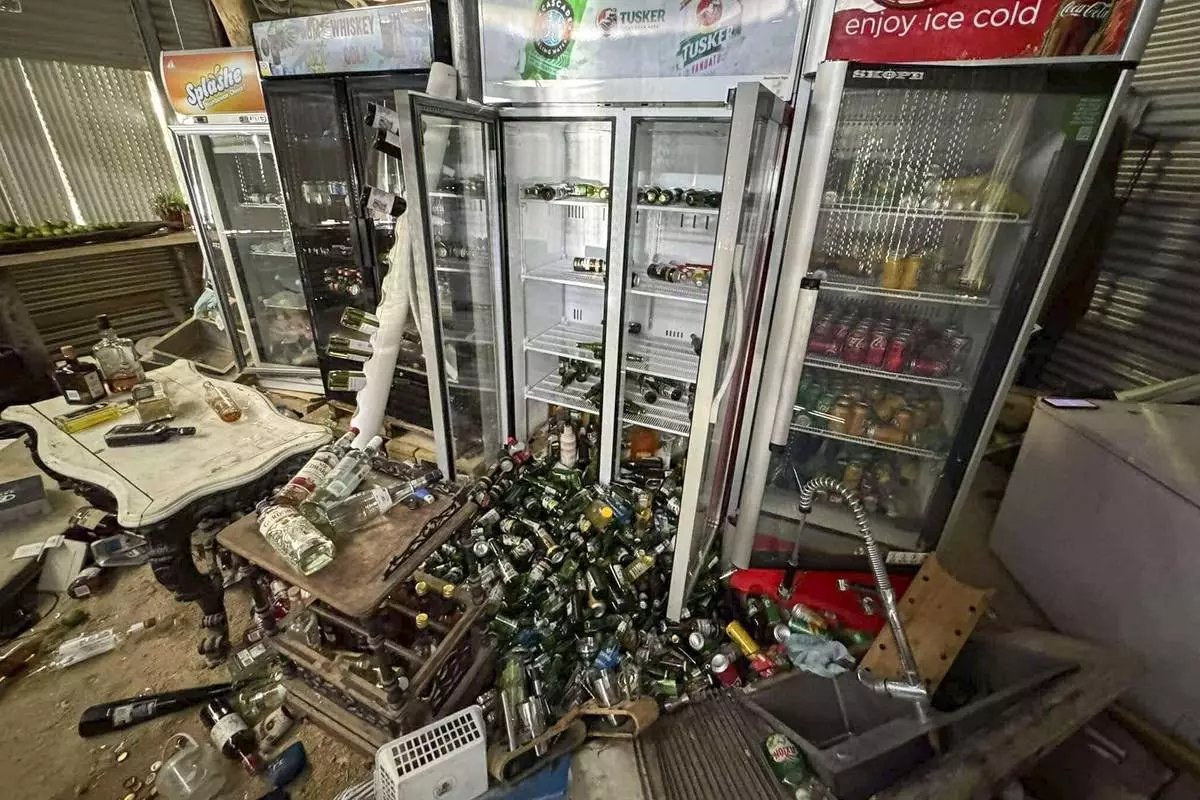
The inside of a building damaged is seen in Port Vila, Vanuatu, following a powerful earthquake Tuesday, Dec. 17, 2024. (Tim Cutler via AP)
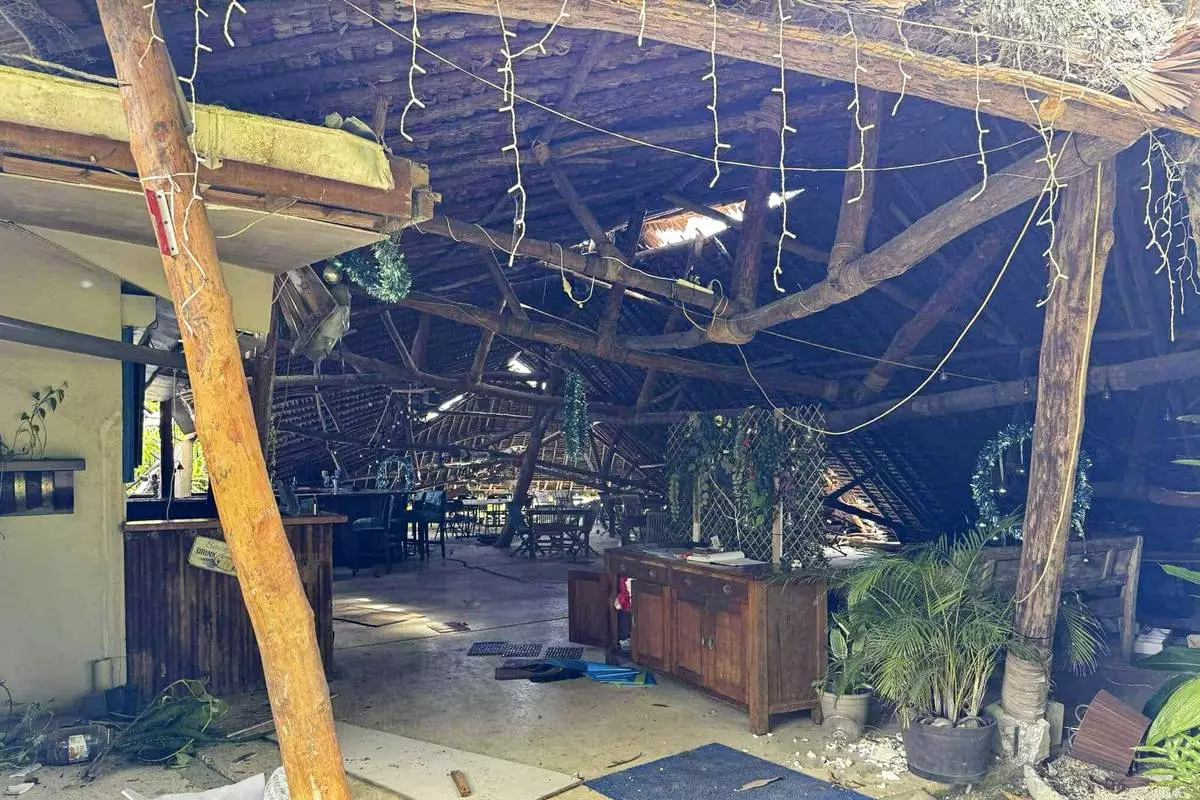
The inside of a building damaged is seen in Port Vila, Vanuatu, following a powerful earthquake Tuesday, Dec. 17, 2024. (Tim Cutler via AP)
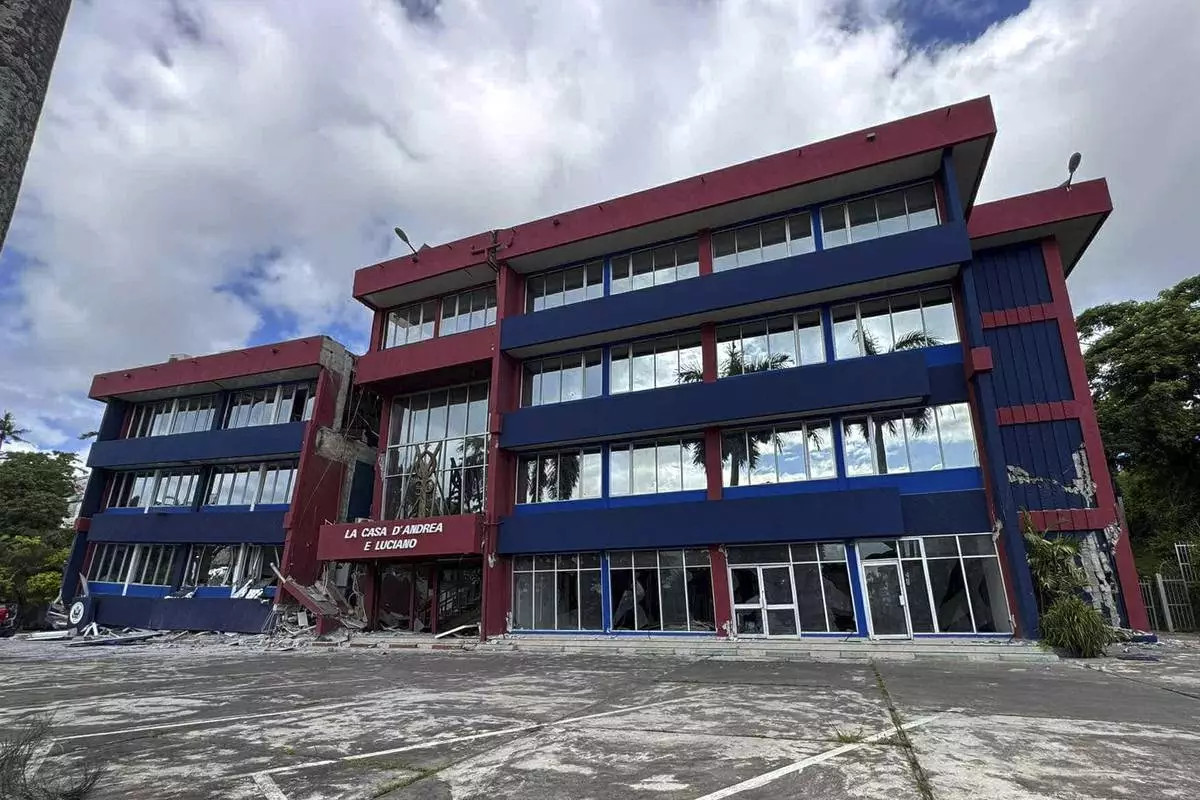
A building is seen damaged in Port Vila, Vanuatu following a powerful earthquake Tuesday, Dec. 17, 2024. (Tim Cutler via AP)
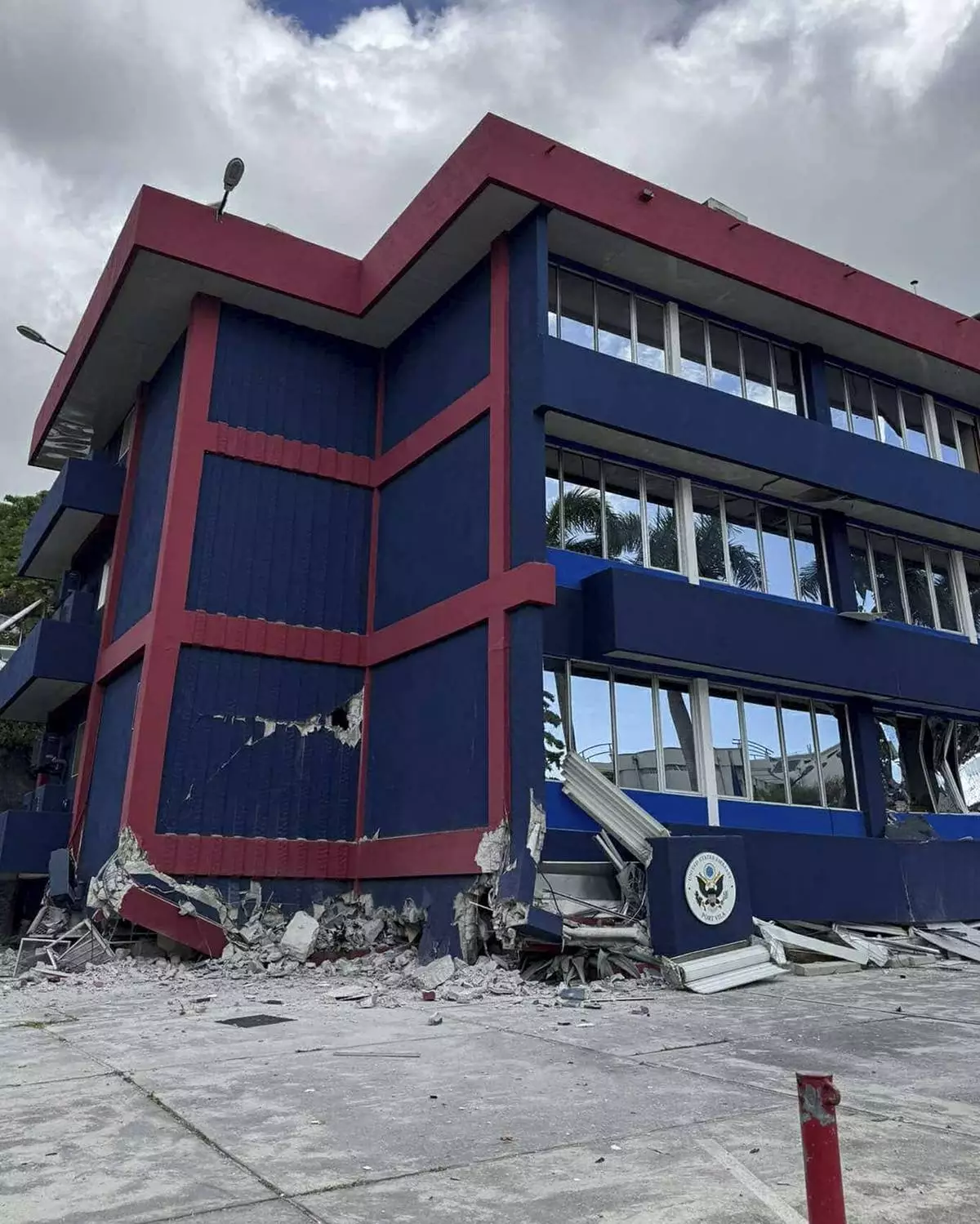
A building is seen damaged in Port Vila, Vanuatu, following a powerful earthquake Tuesday, Dec. 17, 2024. (Tim Cutler via AP)
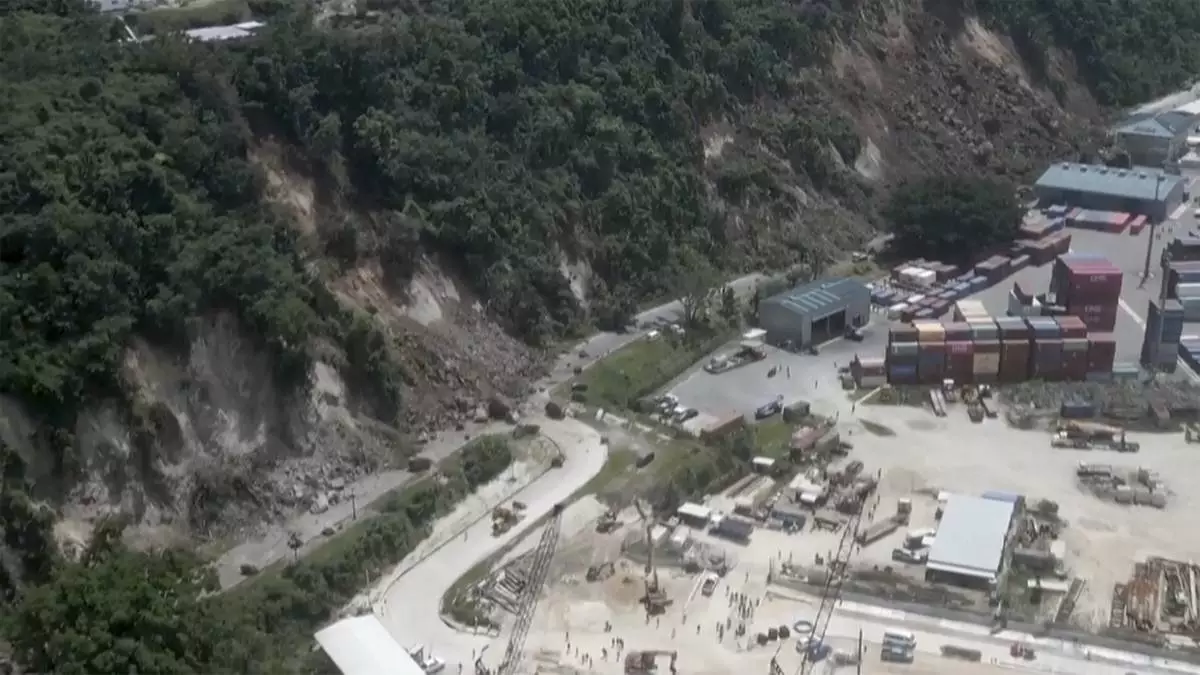
This image made from a video shows a landslide near an international shipping terminal in Port Vila, Vanuatu following a powerful earthquake Tuesday, Dec. 17, 2024. (Dan McGarry via AP)
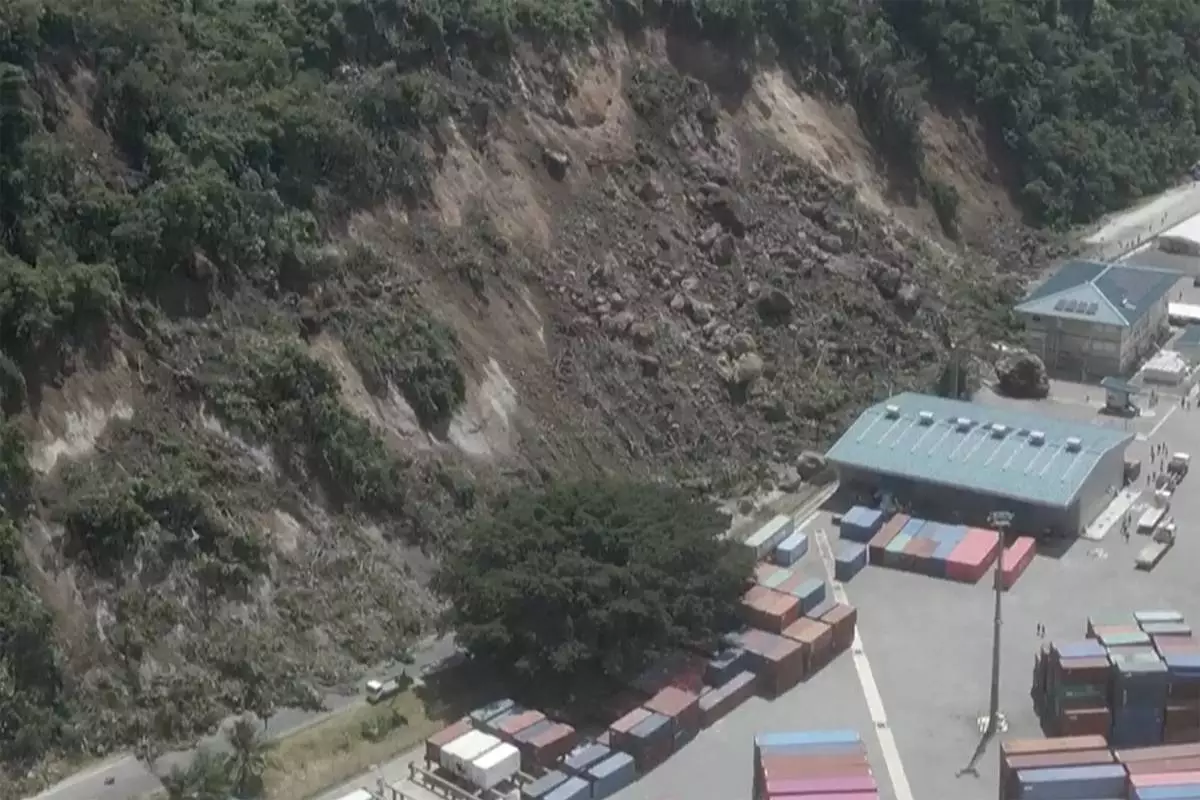
This image made from a video shows a landslide near an international shipping terminal in Port Vila, Vanuatu following a powerful earthquake Tuesday, Dec. 17, 2024. (Dan McGarry via AP)
BANGKOK (AP) — Japanese tycoon Masayoshi Son and President-elect Donald Trump have announced plans for technology and telecoms giant SoftBank Group to invest $100 billion in projects in the United States over the coming four years.
Trump said the investments in building artificial intelligence infrastructure would create 100,000 jobs, twice the 50,000 promised when Son pledged $50 billion in U.S. investments after Trump's victory in 2016.
Son, a founder and CEO of SoftBank Group, is known for making bold choices that sometimes pay big and sometimes don't. SoftBank has investments in dozens of Silicon Valley startups, along with big companies like semiconductor design company Arm and Chinese e-commerce giant Alibaba. The stock market rally and craze for AI has boosted the value of its assets, but it's unclear whether its investments will create that many jobs.
Son founded SoftBank in the 1980s, expanding it from a telecoms carrier to encompass renewable energy and technology ventures. A leading figure in Japan’s business world, he was an early believer in the internet, pouring billions into Silicon Valley start-ups and other technology companies.
Son comes from a humble background. While at the University of California, Berkeley, he invented a pocket translator that he sold for $1 million to Japanese electronics maker Sharp Corp. He has made a career of risk-taking, pushing adoption of broadband services when the internet was still relatively new in Japan. His $20 billion takeover of U.S. mobile phone carrier Sprint Nextel Corp. in 2012 was Japan’s biggest foreign acquisition at the time.
Son is philosophical about his missteps, such as SoftBank's $18.5 billion investment in co-working space provider WeWork, which sought bankruptcy protection last year. SoftBank also invested in the failed robot pizza-making company Zume. Son is canny: SoftBank-related spending on lobbying and donations to U.S. politicians and parties runs into the billions of dollars. And both times Trump was elected, Son was quick to show his support.
SoftBank has benefitted in recent months from rising values of some investments, such as U.S.-based e-commerce company Coupang, Chinese mobility provider DiDi Global and Bytedance, the Chinese developer of TikTok.
Son built his fortune on early investments in search engine Yahoo and China's Alibaba, an astute initial outlay of $20 million in what has become an e-commerce and financial empire with a market cap of more than $200 billion.
SoftBank has investments in T-Mobile, Deutsche Telekom, Microsoft, Nvidia and ride-sharing platform Uber, among hundreds of other companies that it groups together in its Vision Funds. The Saudi Arabian sovereign wealth fund and Abu Dhabi national wealth fund are among the biggest investors in those funds.
The hundreds of start-ups that have received SoftBank investments include Nuro, a robo-delivery company; the dog-walking app Wag; South Korean logistics company Coupang; the Southeast Asian ride-sharing app Grab; and the office messaging app Slack.
After several rough years, SoftBank returned to profitability in the last quarter, helped by returns from its Vision Fund investments. A big factor? Royalties and licensing related to its holdings in the UK-based computer chip-designing company Arm, whose business spans smartphones, data centers, networking equipment, automotive, consumer electronic devices, and AI applications.
SoftBank investor presentations have sometimes featured images of a goose labeled “AI Revolution” laying golden eggs.
Son has said he believes artificial intelligence will surpass human intelligence within a decade, affecting every industry, from transportation and pharmaceuticals to finance, manufacturing, logistics and others and that companies and people working with AI will be the leaders of the next 10 to 20 years. SoftBank's roughly 90% stake in Arm has positioned it well for expansion of AI applications since most mobile devices operate on Arm-based processors.
Trump and Son said the $100 billion that SoftBank has promised to invest will go to building AI infrastructure, but the nature of that spending remains unclear. The eventual impact of AI on jobs remains an open question, but much of its infrastructure is based on energy-guzzling data processing centers that are likely to employ relatively few people once they are built.
Even if SoftBank actually invested the promised $50 billion last time Trump was headed to the White House, it's unclear how many jobs that created.
Shutdowns during the COVID-19 pandemic complicated matters. Foxconn Technology Group, a Taiwan company best known for making Apple iPhones, won Trump’s praise after saying in 2017 it would build a $10 billion complex employing 13,000 people in a small town just south of Milwaukee. But that investment was scaled back drastically.
SoftBank itself says it had 65,352 employees as of March.
Officials in Tokyo praised Son's initiative, viewing it as a goodwill gesture at a time of huge concern over whether Trump will impose blanket tariff hikes on imports from allies like Japan, as well as China.
“Generally speaking, I believe expansion of investment through steady accumulation of efforts between Japanese and U.S. companies would help further strengthen Japan-U.S. economic ties, so I find it delightful,” said Yoji Muto, Japan's Trade and Industry minister.
Associated Press writer Mari Yamaguchi in Tokyo contributed.
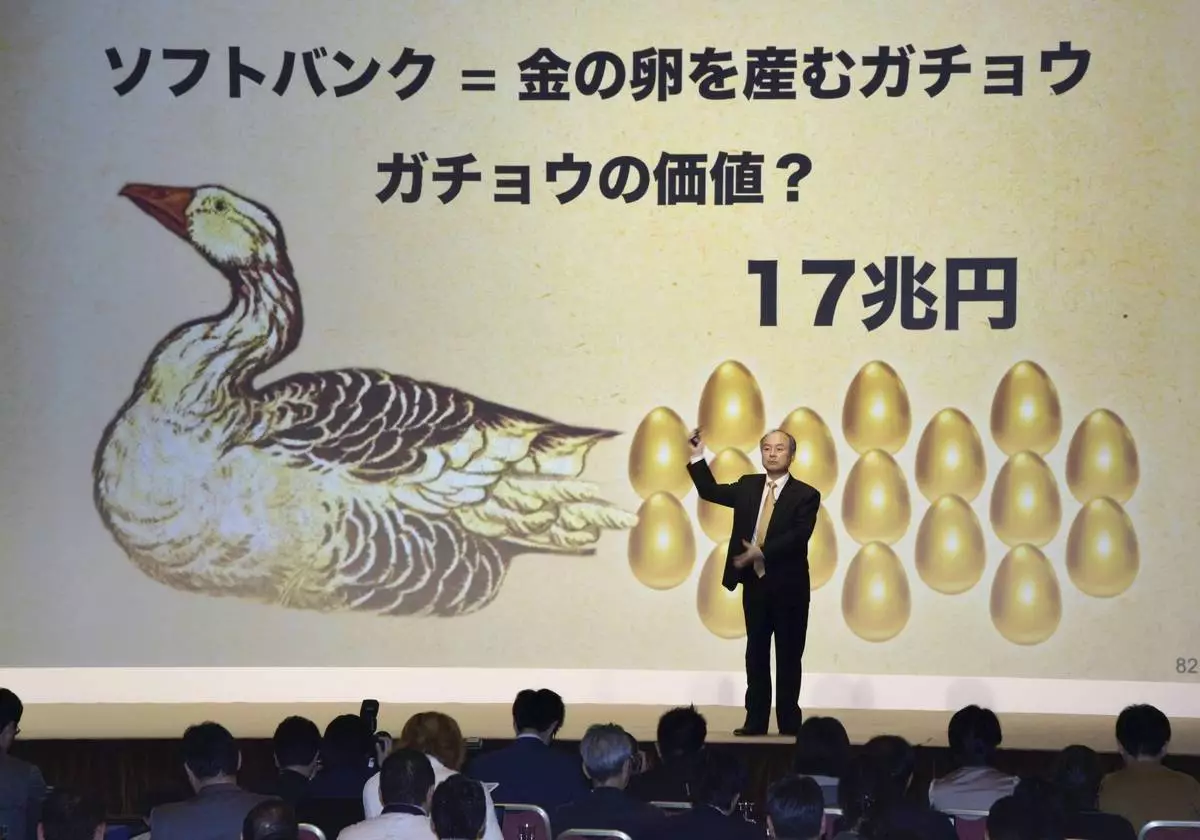
SoftBank Group Corp. Chief Executive Officer Masayoshi Son attends an investor presentation at a Tokyo hotel on May 10, 2017. The letters read: "Softbank = A goose laying the golden eggs." (Kyodo News via AP)
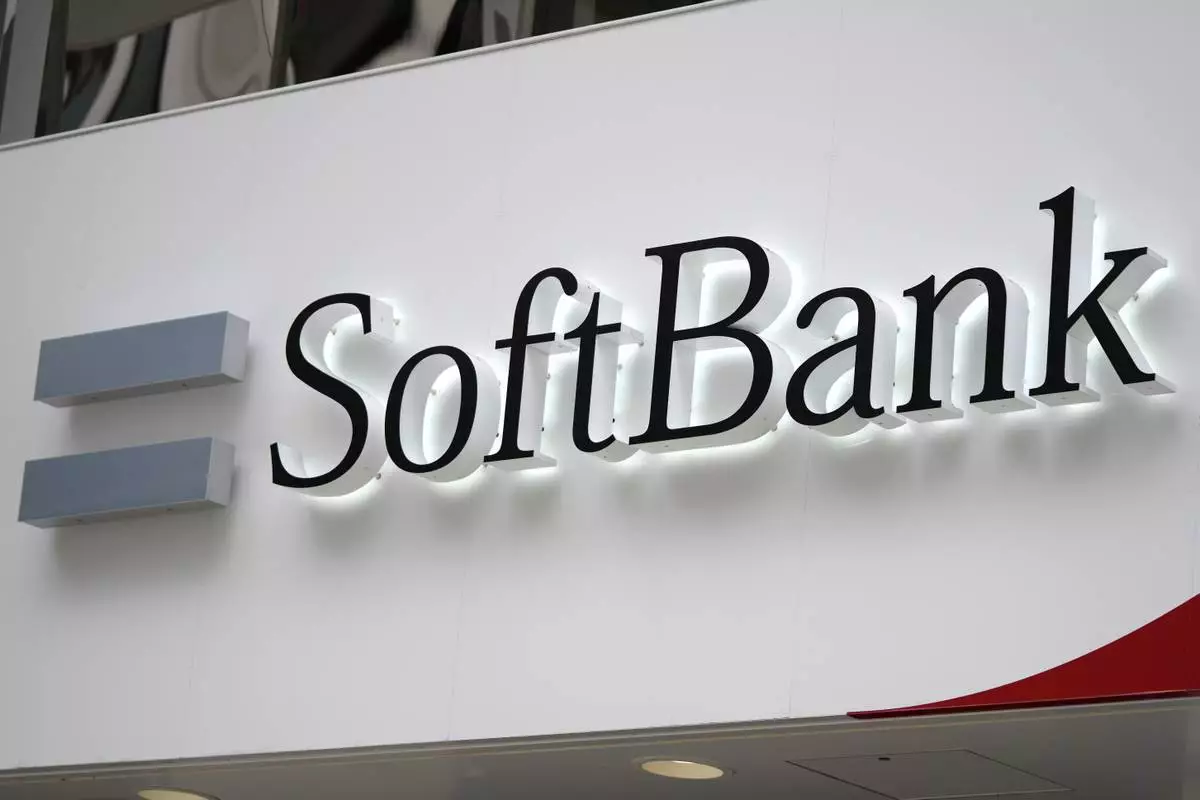
FILE - The logo of SoftBank Corp. is seen at its shop in Tokyo, Thursday, April 21, 2022. (AP Photo/Shuji Kajiyama)
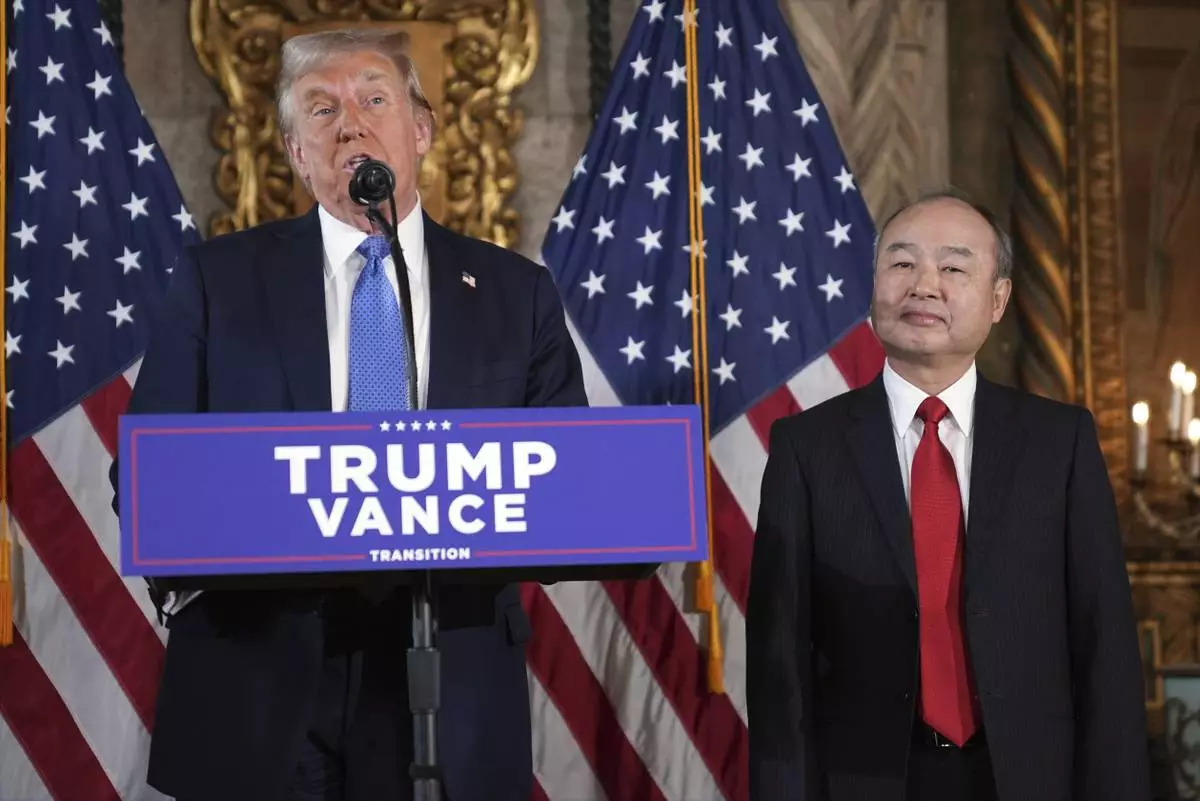
President-elect Donald Trump speaks during a news conference at Mar-a-Lago, Monday, Dec. 16, 2024, in Palm Beach, Fla., as SoftBank Group CEO Masayoshi Son listens. (AP Photo/Evan Vucci)
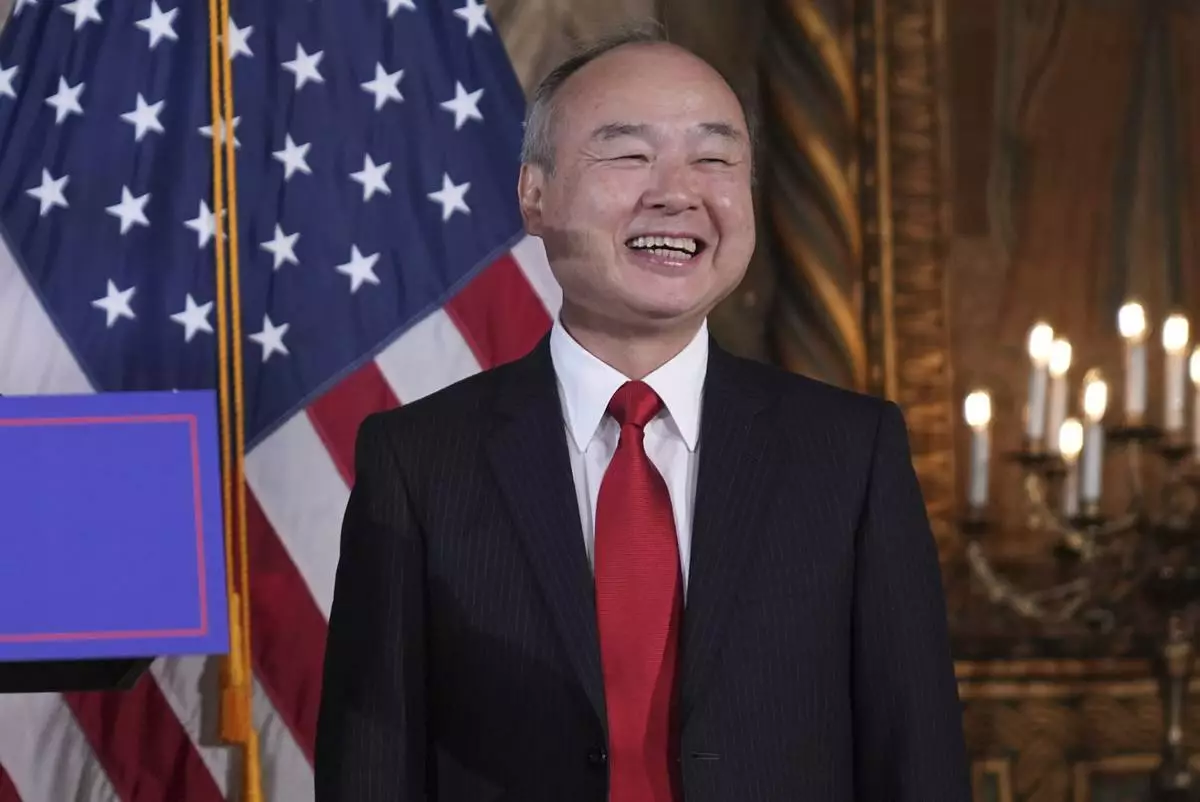
SoftBank Group CEO Masayoshi Son smiles as he listens to President-elect Donald Trump during a news conference at Mar-a-Lago, Monday, Dec. 16, 2024, in Palm Beach, Fla. (AP Photo/Evan Vucci)









